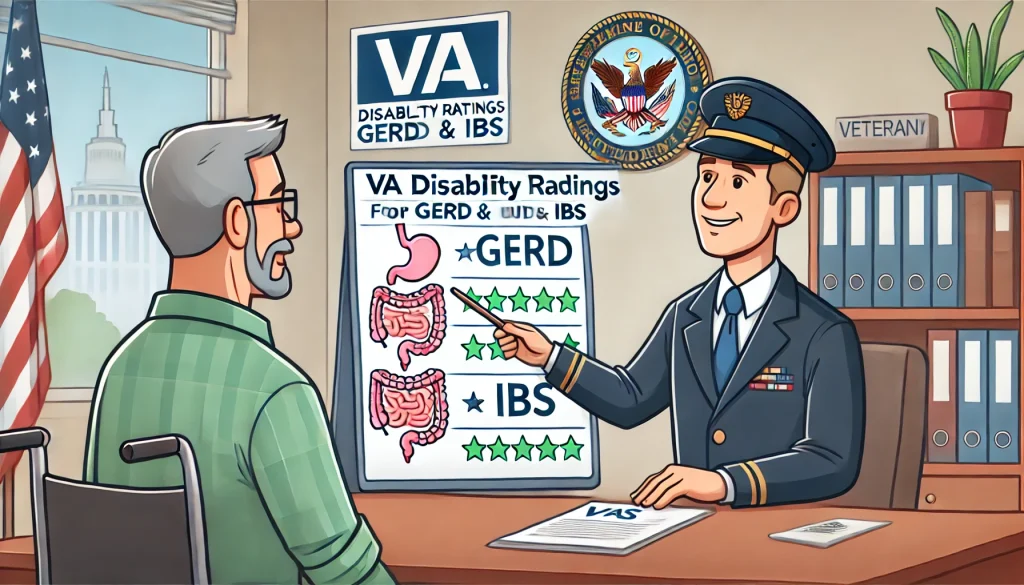For many veterans, digestive disorders like Gastroesophageal Reflux Disease (GERD) and Irritable Bowel Syndrome (IBS) can develop simultaneously, or one condition can lead to or worsen the other.
If you are experiencing both GERD and IBS, and your GERD has developed or worsened due to IBS, you may be eligible for VA disability compensation. This guide explains how to file a claim for GERD secondary to IBS, what the VA disability ratings are for both conditions, and how diverticulitis may also be tied to GERD in VA claims.
GERD Secondary to IBS
IBS is a common gastrointestinal disorder that affects the large intestine and can cause symptoms such as cramping, bloating, and irregular bowel movements. When a veteran suffers from IBS, the digestive system is already under significant stress, and this can lead to or worsen conditions like GERD.
GERD is a chronic condition where stomach acid or bile flows back into the esophagus, causing heartburn, regurgitation, and discomfort. When IBS flares up, it can create additional pressure on the digestive system, contributing to the onset or worsening of GERD.
Veterans who experience GERD secondary to IBS may be eligible for VA disability compensation if they can establish that GERD is linked to their service-connected IBS.
Need Some More Help with your VA Disability?
Learn more about the VA Disability process and get help with our VA Disability Chatbot programmed and trained by AI

VA Disability Rating for GERD and IBS
The VA assigns disability ratings based on the severity of your symptoms and how much they impact your daily life. GERD and IBS are rated under separate diagnostic codes, and veterans can receive individual ratings for each condition. These ratings may be combined, resulting in an overall disability percentage.
GERD VA Rating
- 10% Rating: Mild symptoms of GERD that occur intermittently, with occasional heartburn or regurgitation that can be managed with medication.
- 30% Rating: More frequent symptoms such as persistent heartburn, regurgitation, or difficulty swallowing, which significantly interfere with daily life.
- 60% Rating: Severe GERD symptoms, including constant regurgitation, anemia due to bleeding, or esophageal stricture, that cause serious health problems.
IBS VA Rating
- 0% Rating: Mild symptoms that occur infrequently and do not require continuous treatment.
- 10% Rating: Moderate IBS symptoms, such as alternating diarrhea and constipation, with more frequent flare-ups but not severely impacting daily life.
- 30% Rating: Severe IBS symptoms, including persistent pain, frequent diarrhea, or constipation that greatly impairs daily functioning.
For more information on how the VA rates digestive system conditions, you can visit the latest updates on the VA’s rating schedule here: VA Updates Digestive System Rating Schedule.

How to File a VA Claim for GERD Secondary to IBS
If you believe your GERD is caused or worsened by your IBS, you can file a secondary service connection claim. This means that GERD is secondary to your already service-connected IBS. Here’s how to file:
- Gather Medical Evidence: Collect medical records that show both your IBS and GERD diagnoses. Be sure to include any documentation that shows how your GERD developed after your IBS or worsened as a result of IBS symptoms.
- Nexus Letter: Obtain a nexus letter from a healthcare provider. This letter should explain how your GERD is “at least as likely as not” related to your IBS. The nexus letter is crucial in establishing the secondary connection.
- Submit Your Claim: Use VA Form 21-526EZ to submit your claim for GERD secondary to IBS. You can file your claim online through the VA eBenefits portal or with the help of a Veterans Service Officer (VSO).
For more information on how to file a claim, visit this guide: How to File a VA Claim for Chronic Pain.
Diverticulitis Secondary to GERD
Some veterans may also develop diverticulitis as a secondary condition to GERD. Diverticulitis occurs when small, bulging pouches in the digestive tract (diverticula) become inflamed or infected. While diverticulitis is more commonly associated with conditions like IBS, there is evidence that prolonged inflammation from GERD can contribute to digestive tract complications, including diverticulitis.
Veterans who experience diverticulitis secondary to GERD may be eligible for additional VA disability compensation. Like GERD secondary to IBS, a nexus letter is required to establish the connection between GERD and diverticulitis.
VA Ratings for Digestive Disorders
Veterans can receive disability ratings for multiple digestive disorders, including GERD, IBS, and diverticulitis. The VA uses a combined rating system to calculate the overall percentage when multiple conditions are present. For example, if you have a 30% rating for GERD and a 30% rating for IBS, the VA will combine these ratings rather than simply adding them together.
To understand more about how the VA combines ratings, check out this resource: The PACT Act and Your VA Benefits.
Veterans suffering from GERD secondary to IBS or other digestive disorders like diverticulitis may be eligible for VA disability compensation. By gathering medical evidence, obtaining a nexus letter, and filing the appropriate claim forms, veterans can secure the benefits they deserve for these often debilitating conditions. Understanding the VA’s rating criteria for GERD, IBS, and related conditions is crucial for maximizing your chances of receiving compensation.
For more information on how to file a VA claim for digestive system disorders, check out the latest resources from the VA: VA Digestive System Rating Schedule.
